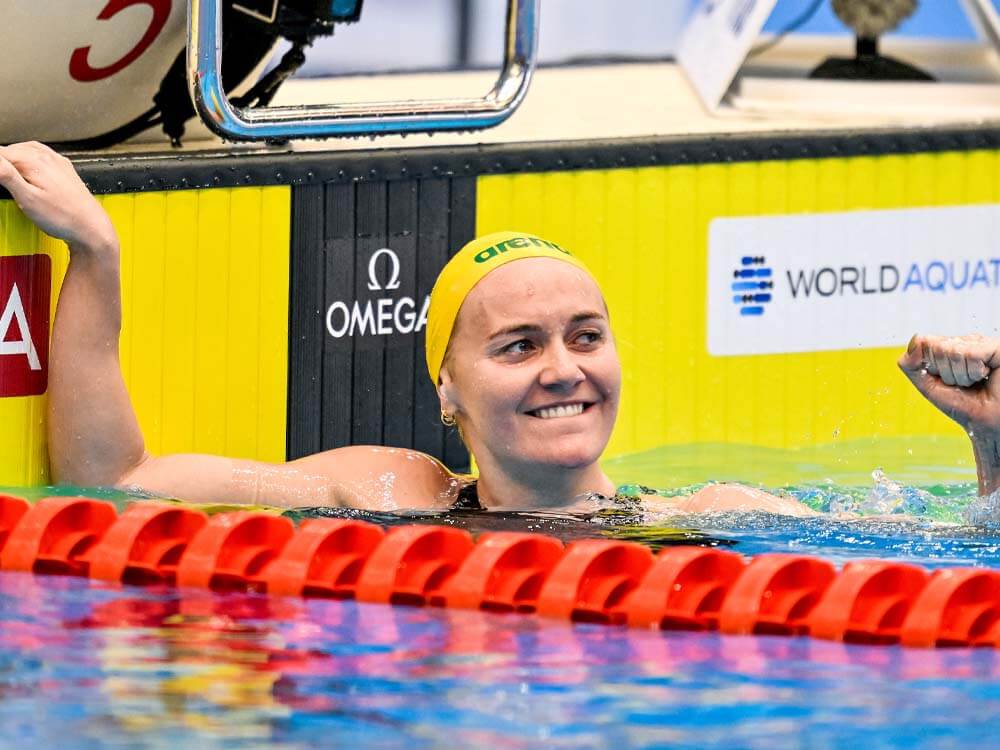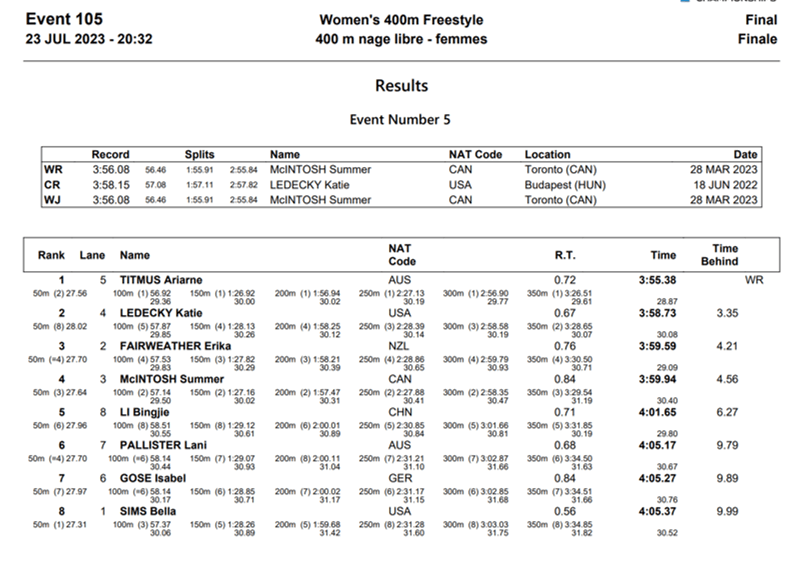World Championships, Day One Finals: Ariarne Titmus Turns Race of the Century Into World-Record Romp

Editorial content for the 2023 World Aquatics Championships is sponsored by FINIS, a longtime partner of Swimming World and leading innovator of suits, goggles and equipment. World Championships, Day One Finals: Ariarne Titmus Turns Race of the Century Into World-Record Romp No more waiting. No more buildup. No more here’s-how-it-might-go scenarios. Just racing, and an answer to the prevailing question in the sport over the past few months – if not the past year. Who will win the Race of the Century: Part II? Eight days of competition at the World Championships in Fukuoka got underway on Sunday at the Marine Messe Hall, and fans were immediately treated to an epic show from Ariarne Titmus. The Australian superstar turned what was supposed to be a three-woman battle into a virtuoso performance, as she shattered the world record in the 400-meter freestyle with a time of 3:55.38. The former record was set earlier this year by Canadian teenager Summer McIntosh at 3:56.08. For months, the swimming world buzzed over the impending matchup between Titmus, McIntosh and American Katie Ledecky. Would all three go under the world record in their Race of the Century? Would Ledecky repeat as world champion? Would McIntosh reaffirm her status as the new kid on the block? In the end, Olympic champion Titmus showed that she’s The One, and she did so in dominant fashion. Titmus trailed at only one juncture during the race, at the 50-meter turn. From there, she was in command. At the midway point, she held a .53 edge on McIntosh, but the gap expanded over the field during the back half of the race. More than a second over world-record pace at the 300-meter mark, Titmus crushed the closing 100 meters in 58.48 to reclaim her global mark. Ledecky rallied during the second half of the race to grab the silver medal in 3:58.73 while New Zealand’s Erika Fairweather ran down McIntosh to pick up the bronze medal in 3:59.59. McIntosh placed fourth in 3:59.93, nearly four seconds off her personal best. “It’s probably my most satisfying win,” Titmus said. “I feel like I didn’t have the most perfect prep coming into this and I think it all came together in the last few months. To swim like that and swim really free and fearless, I feel really over the moon to get that one.” The event was given its nickname due to the credentials it sported. Ledecky, Titmus and McIntosh are the last three world-record setters in the 400 freestyle, and rare are the chances for such a trio to compete against one another in peak form. While Ledecky set three world records in the event from 2014-2016, it was Titmus who wrested command in 2022. Earlier this year, the 16-year-old McIntosh took possession of the world record while racing at the Canadian Trials. Of the now 44 sub-4:00 performances in history, 42 belong to this triumvirate – another illustration of the dominance on display. More, Ledecky was the 2016 Olympic champion and Titmus the gold medalist from the 2020 Games. Really, the race had it all…although Titmus was not about to allow a close fight to materialize. Nicknamed the Terminator, Titmus has long been known for her gutsy approach and deep belief. When Ledecky was swimming in another realm, Titmus – along with coach Dean Boxall – believed she could close the gap on the U.S. legend and establish herself as an all-time great. Indeed, that scenario has come to fruition. “I think it’s about trusting yourself,” Titmus said. “I’ve got ‘fearless’ tattooed on my foot so I can see it right before I dive. Just trying to swim like that little girl that I was. When I was first up against Katie, I was never afraid to take it to her. And Summer and Katie are world-record holders, so I feel like the only way to beat them was to take it out and see who had the most fight and who had the most left in the tank at the end. I’m happy that it worked.” Prior to this evening, the last matchup dubbed the Race of the Century unfolded at the home of the Olympics. At the 2004 Athens Games, the men’s 200 freestyle featured a clash between longtime rivals Ian Thorpe and Pieter van den Hoogenband, and the man who would be the sport’s king – Michael Phelps. Thorpe and van den Hoogenband clashed four years earlier, when the Olympics were held on Thorpe’s home turf in Sydney. In that showdown, the Dutchman prevailed, as he matched his world record from the semifinals with an identical clocking of 1:45.35. That week, a 15-year-old Phelps – still developing into a multi-event monster – just missed out on the podium in the 200 butterfly, finishing fifth. In Athens, the 200 freestyle offered Thorpe the opportunity to avenge his 2000 defeat to van den Hoogenband. By then, the Aussie had reclaimed the world record, making it more than a second quicker than what won Sydney gold. Meanwhile, Phelps had officially morphed into the sport’s featured act, a man talented enough to contest eight individual events on the biggest stage – five of them individual disciplines. Ultimately, it was Thorpe who emerged victorious in that version of the Race of the Century, with “Hoogie” earning the silver medal. Via an American record, Phelps picked up the bronze medal and proved he belonged with the big boys in their specialty event. Nineteen years later, it’s impossible to ignore the parallels between what transpired in Athens and this latest version of the Race of the Century. Like Thorpe and van den Hoogenband, Ledecky and Titmus were the veterans, and had an established rivalry. McIntosh, although the recently minted world-record holder, was the upstart, a la Phelps. On this night, though, Titmus stood alone. “I can’t really complain,” Ledecky said. “I think I executed the race the way I wanted to. I thought that Ariarne and Summer would be out fast, so I wanted to stay in contact and build from there. I felt like I did that. Ariarne just took off. I just lost contact.” By breaking the four-minute mark, Fairweather joined exclusive company as just the fifth woman in history to dip under that barrier. It was an effort that seemed to be within reach, and was deeply satisfying. “I’m really stoked,” Fairweather said. “This has been the goal for a while. I dropped to that four-minute mark a couple of months ago, so to dip under four minutes is unreal.” McIntosh didn’t have the swim she would’ve liked. But the Canadian team was sanguine about it afterward. “Obviously it wasn’t the best night that I’ve had racing so far,” she said. “But I’ll just kind of try and use it as a learning experience heading into the next following days and, of course, Paris as well. Not every race can be a 10 out of 10 so I’m going to try and push forward as much as possible and learn as much as possible from that.”








The race of the century part 2 became a one woman’s race, Titmus was on her own with no challenge after 50 meters